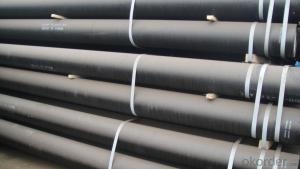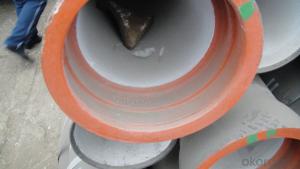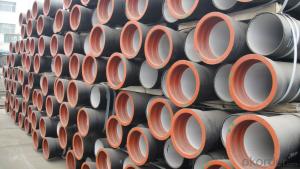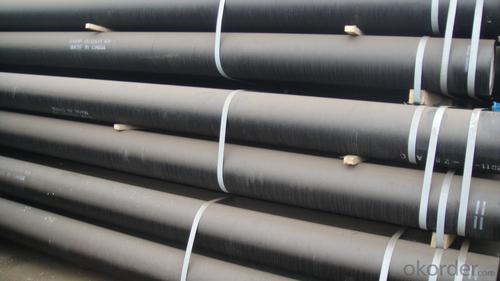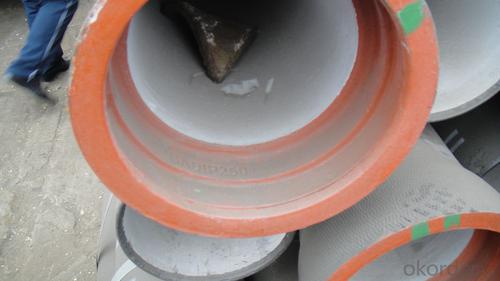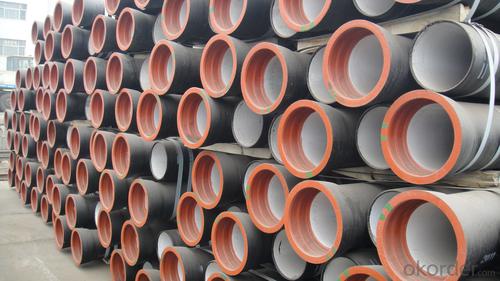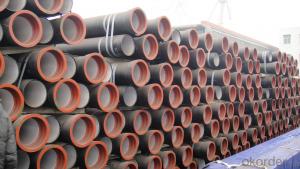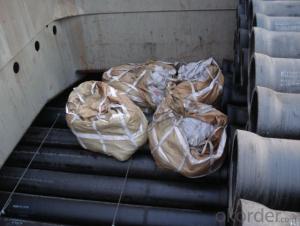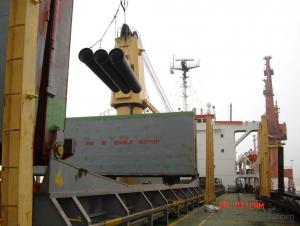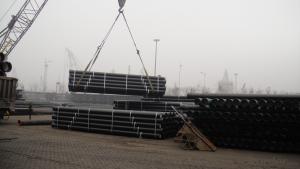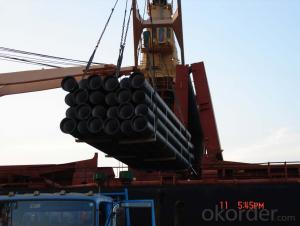Ductile Iron Pipe For Water Project From China
- Loading Port:
- Tianjin
- Payment Terms:
- TT OR LC
- Min Order Qty:
- 50 pc
- Supply Capability:
- 5000 pc/month
OKorder Service Pledge
OKorder Financial Service
You Might Also Like
1. hydraulic hose crimping machine in Electrical equipment&supplies
Specifications
High pressure hose to the winding wire matrix, skin coated refractory coating layer steel braided flame retardant layer
APPLICATIONS:It is mainly used in high temperature surroundings and in conditions having heat source or heat radiation source,such as oil field well-control,metal smelt,and chemical industry.
Inner Diameter of Hose mm | Inside Diameter | Reinforcement Diameter (mm) | Outside Diameter (mm) | Work Pressure (MPa) | Proof Pressure (MPa) | Minimum Explosive Pressure (MPa) | Minimum Bending Radius mm | Refractory °C | |||
Mpa | Psi | MPa | Psi | Mpa | Psi | ||||||
φ13(1/2") | 13±0.5 | 22.2±0.8 | 44±1.06 | 43 | 6230 | 64.5 | 9435 | 86 | 12460 | 230 | 750 |
φ16(5/8") | 16±0.5 | 26±0.8 | 47±1.5 | 38 | 5506 | 57 | 8259 | 76 | 11012 | 260 | 750 |
φ19(3/4") | 19±0.5 | 30±0.8 | 52±1.5 | 34.5 | 4999 | 51.75 | 7498 | 69 | 9998 | 300 | 750 |
φ25(1") | 25±0.8 | 36±0.8 | 59±1.5 | 27.5 | 3984 | 41.25 | 5976 | 55 | 7968 | 360 | 750 |
φ32(5/4") | 32±0.8 | 44±0.8 | 69±2.0 | 20.5 | 2970 | 30.75 | 4455 | 41 | 5940 | 470 | 750 |
φ38(3/2") | 38±1.0 | 76±2.0 | 87.2±5.1 | 17 | 2463 | 25.5 | 3694 | 34 | 4926 | 570 | 750 |
φ51(2") | 51±1.0 | 91±2.0 | 100.7±5.1 | 17 | 2463 | 25.5 | 3695 | 34 | 4926 | 740 | 750 |
2. Antiflaming,fire-resistance rubber hose assembly
Specifications
High pressure hose to the winding wire matrix, skin coated refractory coating layer steel braided flame retardant layer and laye
APPLICATIONS:It is mainly used in high temperature surroundings and in conditions having heat source or heat radiation source,such as oil field well-control,metal smelts,and chemical industry
Inner Diameter of Hose mm | Inside Diameter | Reinforcement Diameter (mm) | Outside Diameter (mm) | Work Pressure (MPa) | Proof Pressure (MPa) | Minimum Explosive Pressure (MPa) | Minimum Bending Radius mm | Refractory °C | |||
Mpa | Psi | MPa | Psi | Mpa | Psi | ||||||
φ13(1/2") | 13±0.5 | 22.2±0.8 | 44±1.06 | 43 | 6230 | 64.5 | 9435 | 86 | 12460 | 230 | 750 |
φ16(5/8") | 16±0.5 | 26±0.8 | 47±1.5 | 38 | 5506 | 57 | 8259 | 76 | 11012 | 260 | 750 |
φ19(3/4") | 19±0.5 | 30±0.8 | 52±1.5 | 34.5 | 4999 | 51.75 | 7498 | 69 | 9998 | 300 | 750 |
φ25(1") | 25±0.8 | 36±0.8 | 59±1.5 | 27.5 | 3984 | 41.25 | 5976 | 55 | 7968 | 360 | 750 |
φ32(5/4") | 32±0.8 | 44±0.8 | 69±2.0 | 20.5 | 2970 | 30.75 | 4455 | 41 | 5940 | 470 | 750 |
φ38(3/2") | 38±1.0 | 76±2.0 | 87.2±5.1 | 17 | 2463 | 25.5 | 3694 | 34 | 4926 | 570 | 750 |
φ51(2") | 51±1.0 | 91±2.0 | 100.7±5.1 | 17 | 2463 | 25.5 | 3695 | 34 | 4926 | 740 | 750 |
3. hydraulic hose Universal Wire-braided DN6
Quick Details
· Place of Origin: Hebei, China (Mainland)
· Brand Name: CMAX/CNBM
· Model Number: GB/T3683-92
Packaging & Delivery
Packaging Details: | hydraulic hose is wrapped with fabrics |
Delivery Detail: | 80000meters/30days |
Specifications
Universal Wire-braided Hydraulic Hose, Q/FLT01-AStandard GB/T3683-92, Temperature range: -40 to +100
Universal Wire-braided Hydraulic Hose
Q/FLT01-AStandard GB/T3683-92
Tube: oil resistant synthetic rubber
Reinforcement: 1 W/B (one high tensile steel wire braid)
Cover: abrasion and weather resistant synthetic rubber
Temperature range: -40 to +100.
4. Drilling Rubber Hose
Quick Details
· Place of Origin: Hebei, China (Mainland)
· Brand Name: CMAX/CNBM
Packaging & Delivery
Packaging Details: | Package: plastic films, then wrapped with fabrics |
Delivery Detail: | According to the Quantity |
Specifications
Drilling hose
DN |
Hose I.D | Wire O.D |
Hose O.D |
Working Pressure | Burst Pressure | Minimum Bend Radius | Weight | Length | |||
inch | mm | mm |
mm | MPa | psi | MPa | psi | mm | kg/m | metres | |
5 | 3/16 | 4.8 | 9.5 | 11.8 | 25.0 | 3630 | 100.0 | 14280 | 89 | 0.19 | 50/100 |
6 | 1/4 | 6.4 | 11.1 | 13.4 | 22.5 | 3270 | 90.0 | 12840 | 102 | 0.21 | 50/100 |
8 | 5/16 | 7.9 | 12.7 | 15.0 | 21.5 | 3120 | 85.0 | 12280 | 114 | 0.24 | 50/100 |
10 | 3/8 | 9.5 | 15.1 | 17.4 | 18.0 | 2615 | 72.0 | 10280 | 127 | 0.33 | 50/100 |
13 | 1/2 | 12.7 | 18.3 | 20.6 | 16.0 | 2320 | 64.0 | 9180 | 178 | 0.41 | 50/100 |
16 | 5/8 | 15.9 | 21.4 | 23.7 | 13.0 | 1890 | 52.0 | 7420 | 203 | 0.45 | 50/100 |
19 | 3/4 | 19.0 | 25.4 | 27.7 | 10.5 | 1530 | 42.0 | 6000 | 241 | 0.58 | 50/100 |
25 | 1 | 25.4 | 33.3 | 35.6 | 8.8 | 1280 | 35.0 | 5020 | 305 | 0.88 | 50 |
32 | 11/4 | 31.8 | 40.5 | 43.5 | 6.3 | 920 | 25.0 | 3600 | 419 | 1.23 | 20/40 |
38 | 11/2 | 38.1 | 46.8 | 50.6 | 5.0 | 730 | 20.0 | 2860 | 508 | 1.51 | 20/40 |
51 | 2 | 50.8 | 60.2 | 64.0 | 4.0 | 580 | 16.0 | 2280 | |||
5. Concrete pump rubber hose
Quick Details
· Place of Origin: Hebei, China (Mainland)
· Brand Name: CMAX/CNBM
Packaging & Delivery
Packaging Details: | Package: plastic films, then wrapped with fabrics |
Delivery Detail: | According to the Quantity |
Specifications
Specifications
High Quality Concrete Pump Delivery Rubber Hose
1.high quality
2.ISO9001:2008
3.reasonable price
1. Material: Black NR and BR synthetic rubber .
2.Reinforcement:Spiral textile/steel wire.
3. Widely application: Schwing PM SANY Zoomlion and other brand concrete pump trucks.
4.Cover:Abrasion resistantant,heat and ozone resistant.
5.Inside diameter:50-152mm
6.Working pressure:8.5 MPA.
7.Detailed specification:
No | Description | ID | OD | Plies | Working Pressure | Burst Pressure | Weight |
1 | 2 inch | 50mm | 70mm | 2 | 8.5MPA 1200PSI | 20MPA 3000PSI | 3.5kgs |
2 | 2.5 inch | 63mm | 88mm | 2 | 8.5MPA 1200PSI | 20MPA 3000PSI | 4.9kgs |
3 | 3 inch | 76mm | 102mm | 2 | 8.5MPA 1200PSI | 20MPA 3000PSI | 6.5kgs |
4 | 4 inch | 100mm | 130mm | 2 | 8.5MPA 1200PSI | 20MPA 3000PSI | 9.3kgs |
5 | 5 inch | 125mm | 155mm | 2 or 4 | 8.5MPA 1200PSI | 20MPA 3000PSI | 10.9kgs |
6 | 6 inch | 152mm | 184mm | 2 | 8.5MPA 1200PSI | 20MPA 3000PSI | 13.3kgs |
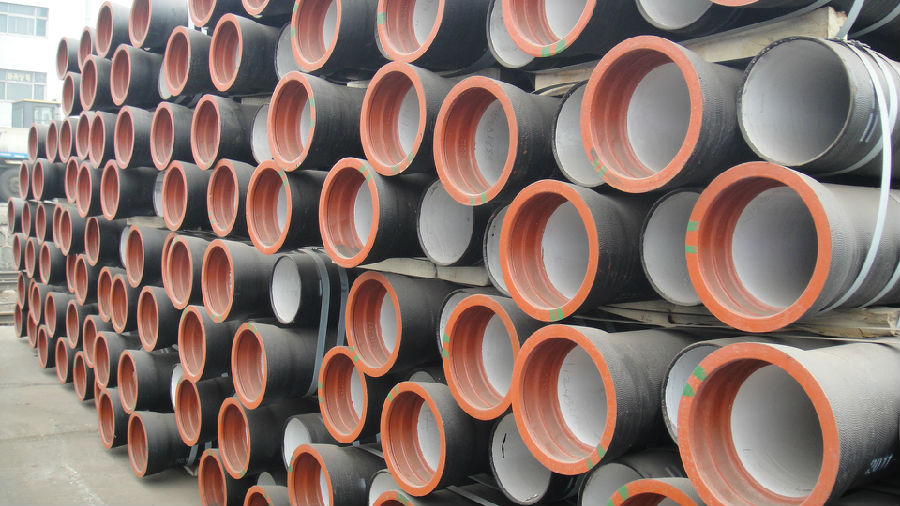
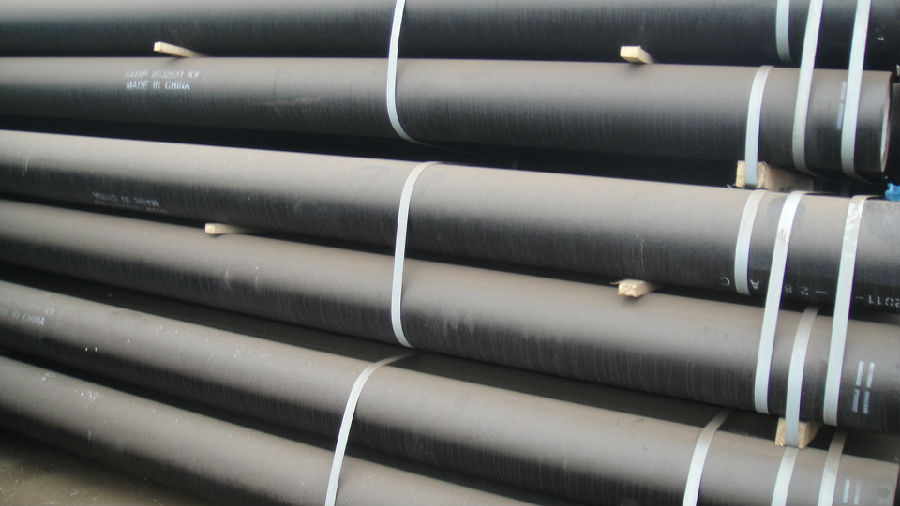
- Q: Are ductile iron pipes resistant to alkali attacks?
- Yes, ductile iron pipes are generally resistant to alkali attacks. The high carbon content and unique microstructure of ductile iron make it highly resistant to corrosion, including attacks from alkali substances.
- Q: How are ductile iron pipes restrained against axial thrust forces?
- Ductile iron pipes are restrained against axial thrust forces through a combination of mechanical restraints and soil resistance. One common method of restraining axial thrust forces is by using thrust blocks. Thrust blocks are concrete structures that are built at bends, tees, and other locations where changes in direction occur in the pipeline. These blocks are designed to resist the axial forces and prevent the pipes from shifting or moving due to the pressure exerted by the flowing fluid. Additionally, mechanical restraints such as pipe restraints, thrust collars, and anchor blocks are used to provide further support and prevent axial movement. Pipe restraints are devices that are installed around the pipe and connected to adjacent structures, such as walls or concrete collars, to prevent movement. Thrust collars are also used to absorb and distribute the thrust forces generated by the flowing fluid. These collars are typically made of ductile iron or steel and are secured around the pipe to resist axial movement. Furthermore, soil resistance plays a significant role in restraining axial thrust forces. The weight of the soil surrounding the pipe creates frictional resistance, which helps counteract the axial forces. Proper trench backfilling, compaction, and adequate embedment of the pipe in the soil are essential to ensure effective soil resistance. In summary, ductile iron pipes are restrained against axial thrust forces through a combination of mechanical restraints such as thrust blocks, pipe restraints, and thrust collars, as well as soil resistance provided by proper trench backfilling and compaction. This comprehensive approach ensures that the pipes remain securely in place and can withstand the axial forces generated by the fluid flowing through them.
- Q: How does ductile iron pipe perform in high-temperature steam applications?
- Ductile iron pipe performs quite well in high-temperature steam applications. Ductile iron is a strong and durable material, known for its ability to withstand high pressures and temperatures. When exposed to high-temperature steam, ductile iron pipes maintain their structural integrity and do not deform or crack easily. They have a high resistance to thermal expansion and contraction, making them suitable for applications where temperature variations are common. Additionally, ductile iron pipes have excellent corrosion resistance, which is especially important in steam applications where the presence of moisture can lead to accelerated corrosion. Overall, ductile iron pipes are a reliable choice for high-temperature steam applications, providing long-lasting performance and ensuring the safe and efficient transportation of steam.
- Q: Are ductile iron pipes suitable for use in saltwater environments?
- Due to their vulnerability to corrosion, ductile iron pipes are generally deemed unsuitable for deployment in saltwater environments. Saltwater, being highly corrosive, can expedite the deterioration of ductile iron pipes. Although ductile iron pipes are known for their strength and durability, they possess a greater susceptibility to corrosion in saltwater when compared to alternative materials such as stainless steel or corrosion-resistant alloys. Consequently, it is advisable to employ materials that are specifically engineered for saltwater environments to guarantee sustained functionality and prevent costly repairs or replacements.
- Q: What is the expected roughness coefficient of ductile iron pipes?
- The expected roughness coefficient of ductile iron pipes is typically between 0.01 to 0.015.
- Q: Are there any alternatives to ductile iron pipe for water distribution?
- Yes, there are several alternatives to ductile iron pipe for water distribution. Some commonly used alternatives include: 1. PVC (Polyvinyl Chloride) Pipe: PVC pipe is a popular choice for water distribution due to its low cost, durability, and corrosion resistance. It is lightweight, easy to install, and requires minimal maintenance. 2. HDPE (High-Density Polyethylene) Pipe: HDPE pipe is a flexible and durable option for water distribution. It is resistant to corrosion, chemicals, and UV rays, making it suitable for both aboveground and underground installations. HDPE pipe is also known for its leak-free joints and long service life. 3. PEX (Cross-linked Polyethylene) Pipe: PEX pipe is a flexible plastic pipe that is commonly used for water distribution in residential and commercial applications. It is known for its resistance to freezing, scaling, and corrosion. PEX pipe is easy to install, has fewer joints, and is highly durable. 4. Copper Pipe: Copper pipe has been used for water distribution for many years due to its excellent corrosion resistance and long lifespan. Although it is more expensive than other alternatives, copper pipe is known for its reliability and ability to handle high pressure. 5. Steel Pipe: Steel pipe is a strong and durable option for water distribution, especially in high-pressure applications. It can withstand extreme temperatures and is resistant to external loads. However, steel pipe is more expensive and requires specialized installation techniques. It is important to consider factors such as cost, durability, corrosion resistance, installation requirements, and specific project needs when choosing an alternative to ductile iron pipe for water distribution.
- Q: What are the typical joint sealing requirements for ductile iron pipes under pressure?
- The typical joint sealing requirements for ductile iron pipes under pressure involve the use of gaskets and mechanical joints to ensure a leak-free connection. Gaskets are typically made of rubber or synthetic materials and are placed between the pipe ends to create a tight seal. These gaskets are designed to withstand the pressure of the flowing fluid and prevent any leakage. They also provide flexibility to accommodate for any slight misalignment or movement of the pipes. Mechanical joints, such as push-on joints or restrained joints, are another common method of sealing ductile iron pipes. These joints consist of a mechanical connection that securely holds the pipe ends together. They can provide a reliable seal without the need for additional gaskets. In addition to gaskets and mechanical joints, proper installation techniques are crucial for ensuring effective joint sealing. This includes proper alignment of the pipes, correct tightening of bolts or screws, and the use of appropriate lubricants or sealants. It is important to note that the specific joint sealing requirements for ductile iron pipes under pressure may vary depending on the application, the type of fluid being transported, and the applicable industry standards or regulations. Therefore, it is essential to consult the manufacturer's guidelines and relevant codes to determine the appropriate joint sealing requirements for a specific project.
- Q: Can ductile iron pipes be used for underground mining applications?
- Yes, ductile iron pipes can be used for underground mining applications. Ductile iron is a strong and durable material that can withstand the harsh conditions and heavy loads associated with mining operations. It has excellent resistance to corrosion and is able to handle high pressure and temperature environments. Additionally, ductile iron pipes are flexible and can be easily installed and maintained, making them suitable for underground mining applications where mobility and adaptability are important. Overall, ductile iron pipes are a reliable and cost-effective choice for underground mining operations.
- Q: How do ductile iron pipes perform in high-velocity water flow conditions?
- Ductile iron pipes perform excellently in high-velocity water flow conditions. Their inherent strength and durability allow them to withstand the force and turbulence of fast-flowing water without any significant issues. These pipes have been extensively tested and proven to maintain structural integrity, resist erosion, and minimize the risk of leaks or bursts, making them a reliable choice for high-velocity water flow applications.
- Q: What material is ductile cast iron 235A?
- Pig iron is an alloy of iron and carbon carbon content more than 2%, pig iron carbon content is generally in 2.5%--4%, including C, SI, and Mn, S, P and other elements, is the use of iron ores in blast furnace products. According to the different forms of carbon in pig iron, and can be divided into pig iron, cast iron and steel ball ductile cast iron. Several precipitation of spherical graphite cast iron. The cutting action on the metal substrate than spheroidal graphite flake graphite cast iron, the strength of the matrix organization strength of 70 ~ 90%, the tensile strength is up to 120kgf/mm2, and has good toughness. Ductile iron chemical composition besides iron usually contains: the amount of carbon 3.3.8%, silicon 2.3.0%, manganese, phosphorus, sulfur and no more than 1.5% of the total amount of rare earth, magnesium spheroiditic agent.
Send your message to us
Ductile Iron Pipe For Water Project From China
- Loading Port:
- Tianjin
- Payment Terms:
- TT OR LC
- Min Order Qty:
- 50 pc
- Supply Capability:
- 5000 pc/month
OKorder Service Pledge
OKorder Financial Service
Similar products
Hot products
Hot Searches
Related keywords
